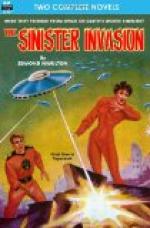But presently he came to a partly-graded new road, cutting across his way. A bulldozer stood abandoned on it, brand-new and in perfect order, with the smell of gasoline and oil about it. He followed the gash in the forest it had begun. It led toward the camp. He came to a place where blasting had been in progress. The equipment for blasting remained. But there was nobody in sight.
Half a mile from this spot, Lockley looked down upon the camp. There were Quonset huts and prefabricated structures. There were streets of clay and wires from one building to another. There was a long, low, open shed with long tables under its roof. A mess shed. Next to it metal pipes pierced another roof, and wavering columns of heated air rose from those pipes. There was a building which would be a commissary. There was every kind of structure needed for a small city, though all were temporary. And there was no movement, no sound, no sign of life except the hot air rising from the mess kitchen stovepipes.
Lockley went down into the camp. All was silence. All was lifeless. He looked unhappily about him. There would be no point, of course, in looking into the dormitories, but he made his way to the mess shed. Some heavy earthenware plates and coffee cups, soiled, remained on the table. There were a few flies. Not many. In the mess kitchen there was grayish smoke and the reek of scorched and ruined food. The stoves still burned. Lockley saw the blue flame of bottled gas. He went on. The door of the commissary was open. Everything men might want to buy in such a place waited for purchasers, but there was no one to buy or sell.
The stillness and desolation of the place resulted from less than an hour’s abandonment. But somehow it was impossible to call out loudly for Jill. Lockley was appalled by the feeling of emptiness in such bright sunshine. It was shocking. Men hadn’t moved out of the camp. They’d simply left it, with every article of use dropped and abandoned; nothing at all had been removed. And there was no sign of Jill. It occurred to Lockley that she’d have waited for Vale at the camp, because assuredly his first thought should have been for her safety. Yes. She’d have waited for Vale to rescue her. But Vale was either dead or a captive of the creatures that had been in the object from the sky. He wouldn’t be looking after Jill.
Lockley found himself straining his eyes at the mountain from whose flank Vale had been prepared to measure the base line between his post and Lockley’s. That vantage point could not be seen from here, but Lockley looked for a small figure that might be Jill, climbing valiantly to warn Vale of the events he’d known before anybody else.
Then Lockley heard a very small sound. It was faint, with an irregular rhythm in it. It had the cadence of speech. His pulse leaped suddenly. There was the mast for the short wave set by which the camp had kept in touch with the outer world. Lockley sprinted for the building under it. His footsteps sounded loudly in the silent camp, and they drowned out the sound he was heading for.




